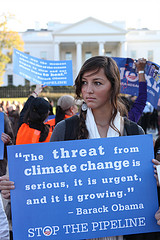We Can Stop What’s Coming
This past weekend, activists surrounded the White House, calling for President Obama to stop the Keystone XL tar sands pipeline. Their actions matter. We can stop what's coming.

This weekend, more than 10,000 people surrounded the White House in Washington D.C., urging President Obama to prevent construction of TransCanada’s proposed Keystone XL pipeline.
The project would facilitate the mining of tar sands deposits in Canada and delivering the resulting fuel to the international market. The protestors rightly point out that developing this resource would take us the wrong way in the fight against global warming. NASA’s James Hansen has even said that “if the tar sands are thrown into the mix it is essentially game over” for stabilizing the climate below 2 degrees Celcius warming — the threshold the international community has set as a target for preventing the worst impacts of climate change.
A few pundits have dismissed the actions of the pipeline protestors as meaningless. Jonathan Levi at the Council on Foreign Relations wrote, “keep oil demand on its current trajectory and we’ve got huge climate problems regardless of whether Keystone XL is approved.” Andrew Revkin at The New York Times wrote, “it’s a distraction from core issues and opportunities on energy and largely insignificant if your concern is averting a disruptive buildup of carbon dioxide in the atmosphere.” Similarly, Jordan Weissman atThe Atlantic said “whether or not Keystone XL gets built, chances are [oil] corporations will find a way to move their crude to market. […] You know that line from No Country For Old Men: “You can’t stop what’s comin'”? It applies here.”
Most of their reasoning hinges on objections that it would take a long time to get all of the tar sands out of the ground, so the climate impact of stopping the pipeline would not be as great as other actions to cut oil demand. (And yes, a carbon tax or cap-and-trade policy would make a great difference here.)
However, these pundits are missing the point entirely.
First, putting a pipeline into the Tar Sands is like poking a hole in a reservoir. Simply put, the pipeline would make it more likely for pollution to leak out.
But more importantly, the fight against the pipeline is about power. As Frontier Group argues in our recent report, The Way Forward –
Today’s work for clean energy must not only be an end in and of itself, but it must also be used as a means of changing the political calculus to make bolder action on global warming possible in the years to come.
That is where the fight against the Keystone XL pipeline really has a chance to shine.
Right now, fossil fuel companies have a lot of power, and advocates for a clean energy future do not have enough. If we are to turn the corner away from fossil fuels as fast as we need to, then we need to accumulate a lot of power as fast as possible.
Bill McKibben and the team at 350.org have drawn a line in the sand (so to speak). By taking a stand here, they have made a place for people who care about a liveable future for their children and grandchildren to gather and build power.
Similarly, our work at Frontier Group has helped new constituencies — like solar and wind power companies — emerge and grow and help to shift the playing field upon which decisions about global warming continue to be made.
Actions like these — even if their impacts are individually small — have the potential to add up to so much more. They are the way forward.
I hope that President Obama will put the brakes on this pipeline. And I hope that the action will build momentum for greater victories in the future.
We can stop what’s coming. We must. Let’s get to work.
